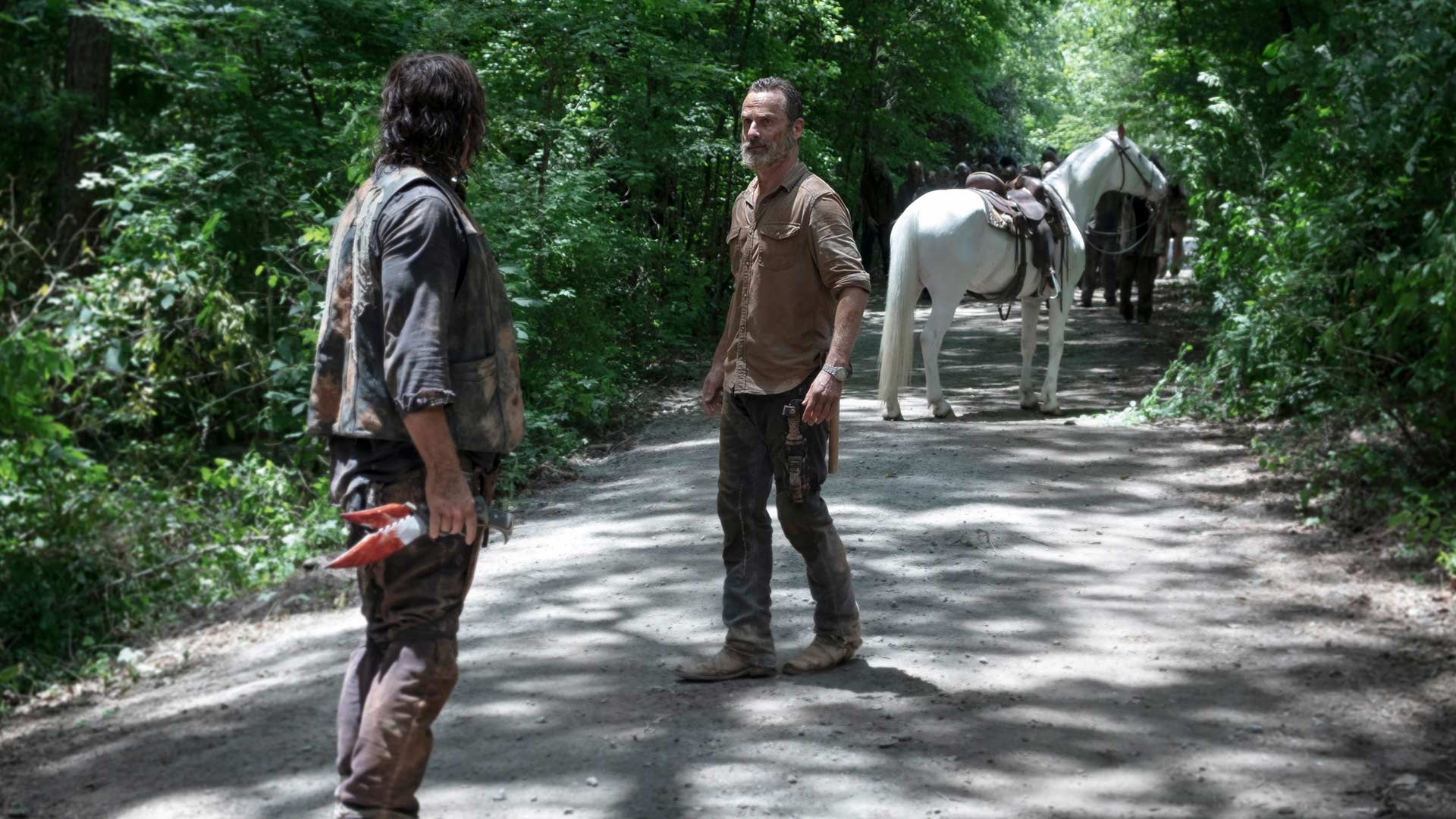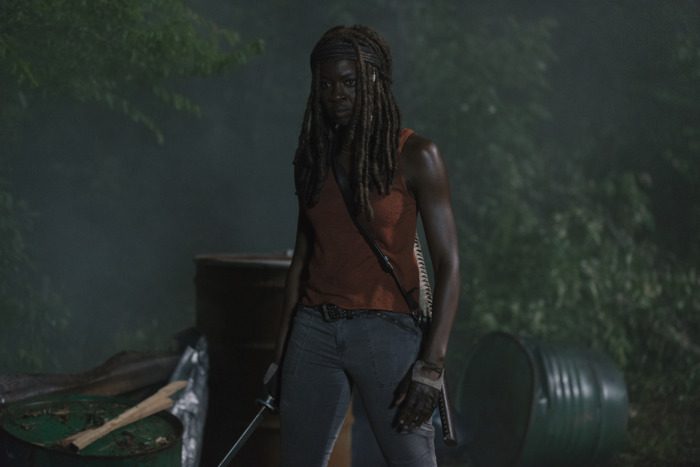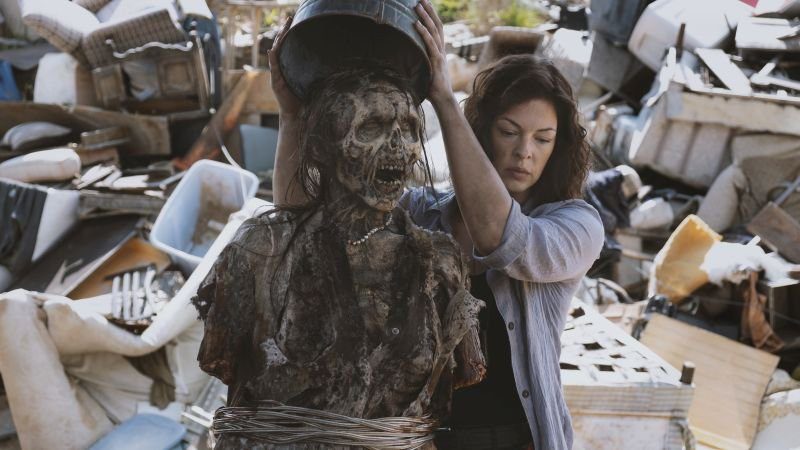The Walking Dead has been on the air since 2010, and despite its ever-evolving cast of characters, it has almost never been able to credibly produce a sense of peril. We’ve always been able to tell those who would survive from those who wouldn’t. Occasionally the show would upend expectations – who would have thought that Eugene would still be alive in a world where Glenn, Carl, and Abraham aren’t? – but for the most part it was always predictable. Characters like Rick, Maggie, Carol, and especially Daryl have been safe for a while now. Whenever a character was going to die – Bob, Tyreese, T-Dog, Beth – TWD always showed its hand, giving them a whole showcase episode. “The Obliged” – which isn’t as successful as last week’s “Warning Signs,” but is far from a disaster – succeeds is in reintroducing stakes. For the first time in a long time, we find characters in a situation from which there is no obvious escape, no surmountable human obstacle. It makes for tense, and, yes, thrilling television. It feels like The Walking Dead is getting its mojo back, little by little.
Speaking of which, Michonne really needs to get her groove back. “The Obliged” opens with a solid montage of her running thing around Alexandria, and then going out at night to kill walkers with her katana. Throughout, Bear McCreary’s excellent score grows more frantic and urgent, and we get the sense that this kind of life is stifling to Michonne, that she misses being a warrior. This will come back into play later in the episode, but without the elegance of this cold open. Sometimes The Walking Dead works best as a silent film, and that’s never more evident than when a disarmed Michonne picks up a bat – Lucille, as it turns out – to kill a walker, only to look at it in horror afterwards. “The Obliged” takes pains to draw a neat line between her and Negan, and while it isn’t always successful, it does sometimes produce nice moments like this.
Which is as good a segue as any to talk about Negan’s presence in this episode. He’s refusing to eat, and intimates that he’ll stop his hunger strike if Michonne will sit and talk with him. TWD is making a misstep keeping Negan shrouded in darkness, because it’s clearly waiting to make a big reveal, when we can see his bushy beard, and presumably a big scar across his throat. The problem with the Negan/Michonne scenes is that the show so clearly plays its hand. It’s trying to turn Negan into a Hannibal Lecter character, and while he does get under Michonne’s skin, it’s not as effective as it should be, for a number of reasons. One, the dialogue lacks the sinister playfulness of anything on Hannibal, and two, it’s so obvious what the show is aiming for. It demands our cooperation, but it’s hard to reconcile this version of Negan with the preening showboat we’re used to. This seems less like character development than it does narrative convenience.
Negan’s presence looms larger over this episode than any other this season. Rick learns that Maggie is on her way to Alexandria, and he (correctly) surmises that she’s going there to kill Negan. Daryl offers to drive Rick back to stop her, but purposely takes them off course. For the first time in a long time, TWD gives us a solid scene between Rick and Daryl, whose chemistry has helped propel the show since the midpoint of season one. What surprises me most about this season – the show’s ninth, remember, far past the point where it should be reinventing itself – is the strength of the dialogue. And the fact that it actually seems to have something on its mind, namely how people deal with trauma, and the value of revenge and mercy.
Daryl reasons (correctly) that Negan’s continued existence is only encouraging people like Justin, former Saviors who want the war to start again. Rick replies (also correctly) that killing Negan would just turn him into a martyr. The thing is, they’re both right, and The Walking Dead isn’t didactic in its approach to the conflict; it doesn’t come down on either side of the issue. For a show that was so dumb for so long, it’s pretty incredible to see TWD trust its audience again.
But the real centerpiece of the show is Daryl and RIck’s escape from a pit. The imagery is reminiscent of the pilot episode, with Rick trapped in a tank. We’ve seen him in inescapable situations before – the RV from a few seasons back, for instance – but the difference here is that we know that “The Obliged” is Andrew Lincoln’s penultimate episode of the show. There doesn’t have to be an easy escape; no one has to get out alive. This knowledge makes the escape that much more thrilling, even (maybe especially) as it turns into something out of a video game, as Daryl has to dodge falling walkers while using a root as a rope to climb out of the pit. Beyond that, Rick is tormented by the sounds of gunfire coming from the camp, the soundtrack of his utopia falling apart before it even took shape.
At the end of “The Obliged,” Rick is impaled on a piece of rebar, helpless and prone as two walker herds – codenamed “Tybalt” and “Cordelia” by Eugene, in a little touch that I loved – converge on him. If Rick were to die (as, let’s face it, he probably will), I’d miss him, but he’d be leaving a better show behind. The Walking Dead is succeeding this season in its back-to-basics approach, and that might necessitate hitting the reset button, and going all the way back.
3.5/5
A Few Thoughts
- I didn’t mention the scene between Gabriel and Anne, but I want to say that it included Seth Gilliam’s best acting on this show, ever. Another actor tackling the material with renewed vigor.
- Negan is 100% going to get out of prison and become the villain again, and when that inevitably happens my eyes will roll out of their sockets, but for now I’m going to like The Walking Dead for as long as it will let me.
- Michonne’s “M” necklace is a weirdly tacky piece of jewelry for her, right? Maybe it’s just me.



